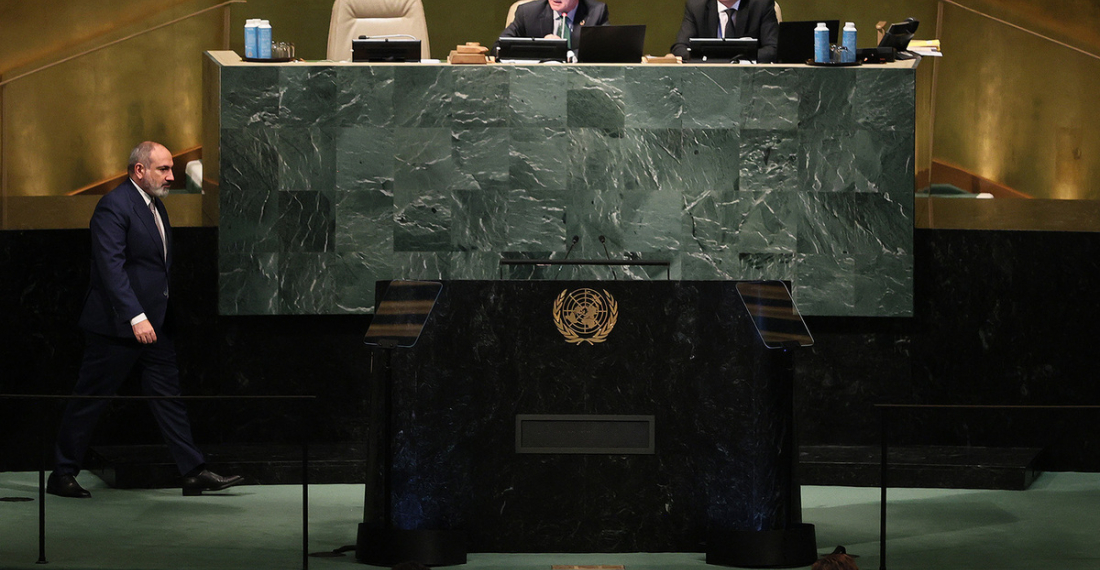The Armenian Prime Minister Nikol Pashinyan addressed the 77th Session of the UN General Assembly on Thursday (22 September). He spoke mainly about the latest altercations between Azerbaijan and his country that have taken place since Tuesday (13 September). Pashinyan maintained that Azerbaijan launched an unprovoked attack on the sovereign territory of the Republic of Armenia, violating the trilateral ceasefire signed on 10 November 2020.
He claimed that the attack went beyond the border as the Azerbaijani military shelled “36 residential areas and communities, including towns of Goris, Jermuk, Vardenis, Kapan, Geghamasar, deep within the sovereign territory of Armenia”. This attack was further addressed and condemned at the request of Armenia by the UN Security Council. Pashinyan further claimed that Azerbaijan purposefully targeted civilians and vital infrastructures such as schools, medical facilities, water, and electrical infrastructures, such as the Kechut water reservoir “displacing more than 7,600 persons, amongst them 1,473 children and 99 persons with disabilities”. He argued that “as a result of the aggression, the number of victims and missing persons at the moment exceeded 207”. He further claimed that there is evidence of torture, mutilation of captured or dead Armenian soldiers, as well as extrajudicial killings of prisoners of war. Pashinyan also mentioned that videos have surfaced on the internet of Azerbaijani military servicemen allegedly mutilating Armenian female personnel, and other war crimes.
Later in his speech he touched on the related topic of border delimitation. Pashinyan stated that progress towards peace can only happen if both parties recognise each other’s territorial integrity. Hence Azerbaijan needs to concretely recognise the integrity of the 29.800 km2 of Armenia, otherwise he argues that “Azerbaijan will use the border delimitation process for new territorial claims”.
He also touched on opening the region’s “transport communication links” as per Article 9 of the 10 November 2020 trilateral statement. Pashinyan claims that Armenia is ready to build new routes between mainland Azerbaijan and its Nakhchivan Autonomous Republic exclave, as long as the route would operate “according to the legislation and within sovereign control of the Republic of Armenia”. The Prime Minister further argued that Azerbaijan is pushing Armenia to agree to an extraterritorial corridor claiming that it is within the rights of the trilateral statement. However, he argued that the article only mentions one corridor that Armenia should provide: the Lachin corridor.
Furthermore, Pashinyan focused on another crucial factor that needs to be met in order to reach regional stability. He demanded that the rights and protections of Armenians living in the Nagorno-Karabakh region need to be addressed and guaranteed, while post-war rehabilitation including the repatriation of prisoners of war should be high on the agenda. Furthermore, he insisted that the “Armenians in Nagorno-Karabakh are in need of the support of the international community”, and the “unhindered access of UN humanitarian agencies [including] the Office of the UN High Commissioner for Refugees and the independent fact-finding mission of UNESCO” should be permitted.
Lastly, he finished his speech by announcing his country’s strong support of democracy and how the conflict not only affects Armenia’s sovereignty but also its independence and democracy. He called for the support of the international community and added that an “international observation mission on the Armenian-Azerbaijani border would be an important factor for regional stability”. He concluded on a hopeful note that Armenia is committed to peace through diplomatic efforts.
The full speech is available on the website of the Armenian Prime Minister here



